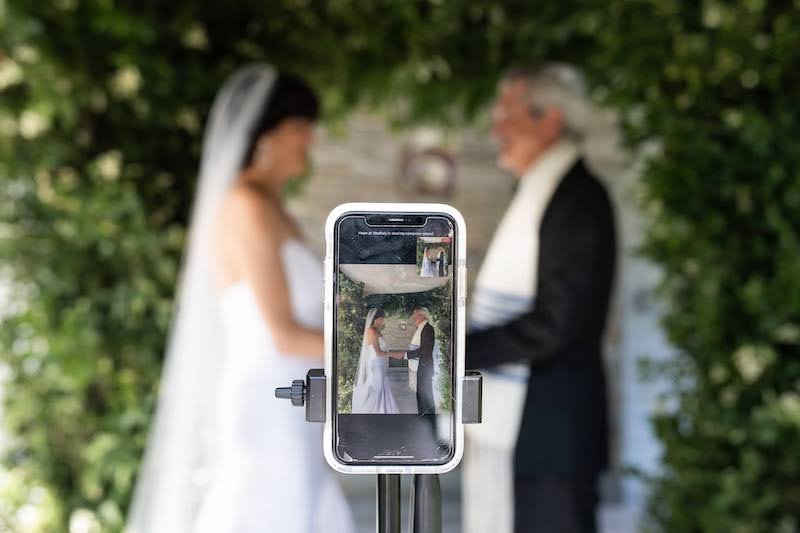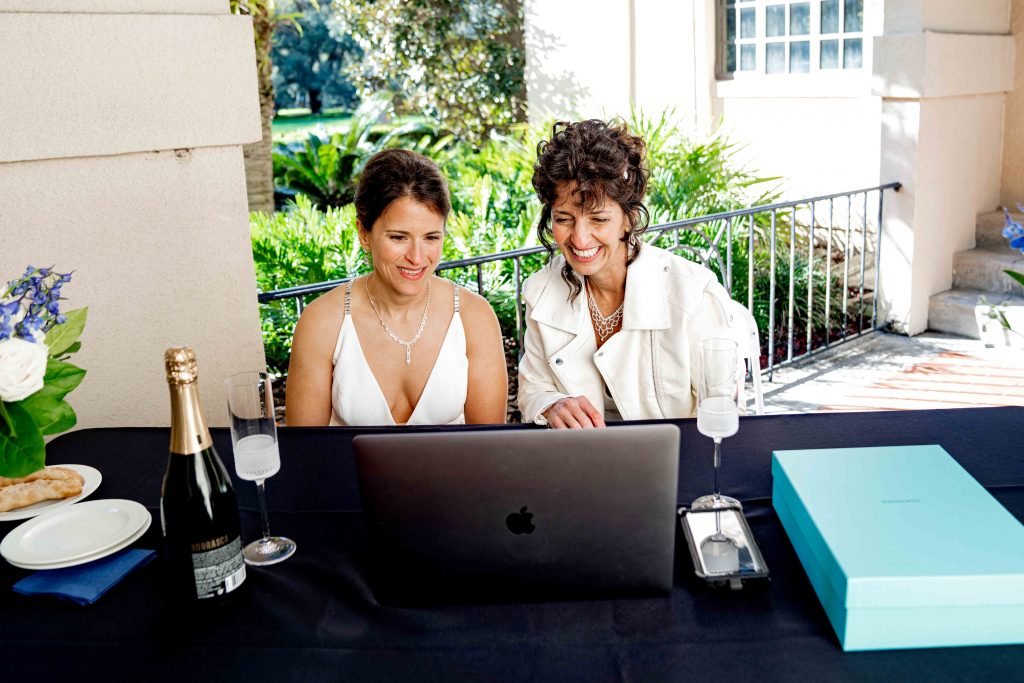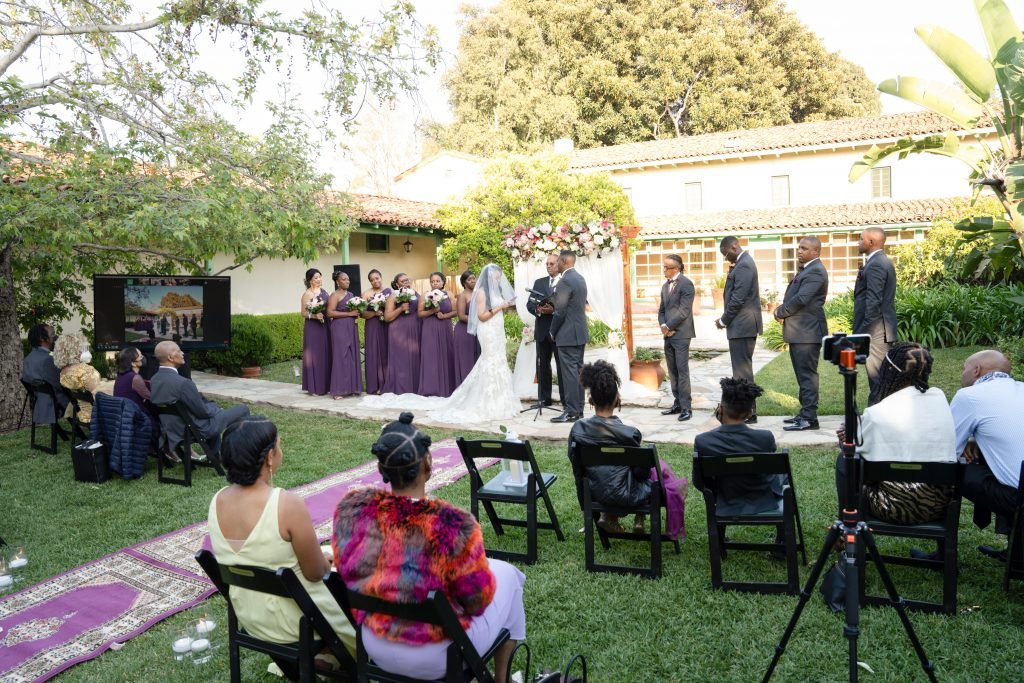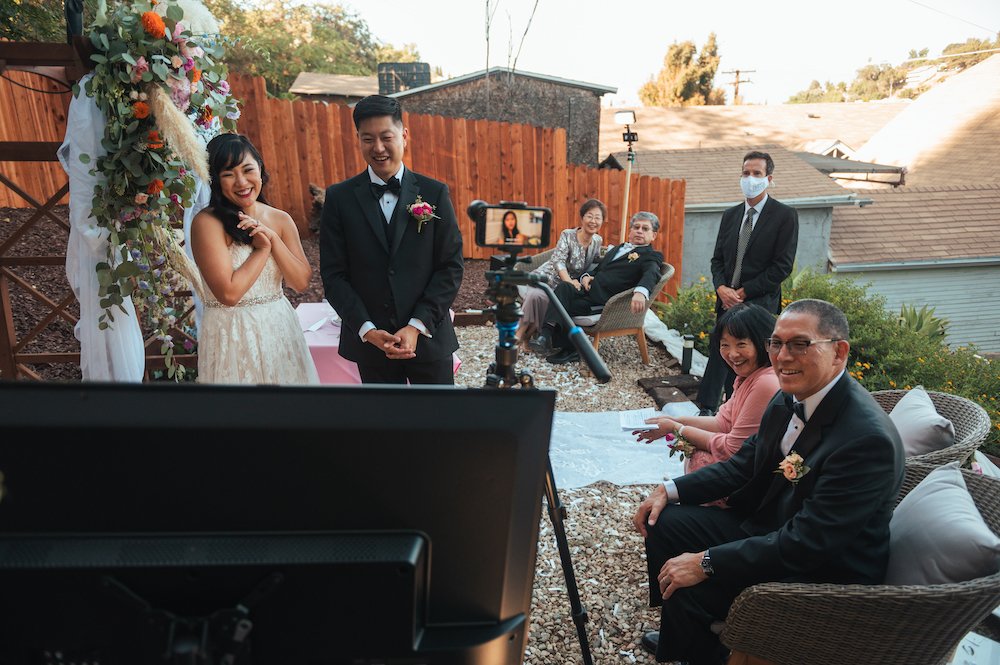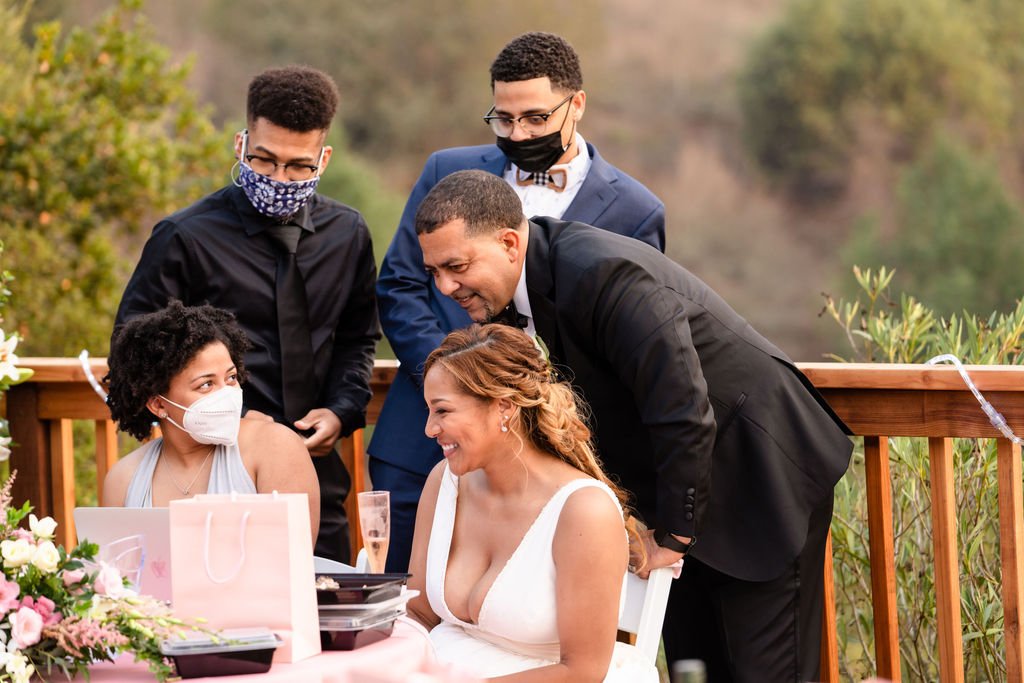Is It Legal to Have a Virtual Wedding?
*Updated June 18th 2021
Read on for all the dirt on how to make sure your virtual wedding checks all the legal boxes. The virtual wedding pros at Wedfuly would love to help create an elevated, super fun virtual wedding experience for your guests – and a stress-free wedding day for you! Click here to get started >
A look at how different states are handling the legality of virtual weddings during the pandemic. (And how this could affect things post-pandemic).
You’ve already dreamed up the *perfect* wedding hashtag and backyard set-up for your virtual wedding. Now you’re here….wondering how this whole Zoom wedding works and whether it is considered legal where you live. Before jumping into how the legality varies state by state, let’s revisit the basic steps of how to get married and make it official.
Step 1: Set up an appointment with your county clerk to obtain a marriage license. Make sure to check beforehand to see if your county’s offices are still open or if you will need to set up a virtual appointment. (**Most county clerk offices are open at this point, but just might require an appointment beforehand.) Additionally, states have varying laws on how long you can hold onto a marriage license before getting married. The range spans all the way from 35-90 days, so make sure to check based on your state and county.
Step 2: Visit the county clerk (whether in person or virtually) and bring required documents.
Here’s what you’ll need to bring along:
Proof of identity (check state requirement, typically a license or passport)
Witness (Not all states require)
Parental information (DOB, full names, birth state, dates of passing)
Certificate of the previous divorce or partner death (if applicable)
If you’re under 18, you’ll need a parent present
Marriage license fee money
Step 3: Get your signatures. This varies state by state, but you will most likely need signatures from your officiant and witnesses. **Note, some states require the officiant to be present to sign the marriage license in person, some allow it to be mailed back and forth. We will visit this later in the article.
Step 4: GET MARRIED! Pop the champagne and then pop on over to the county clerk’s office (or mail) to return the signed marriage license.
Photo credit: Azul Photography
Now that the basics have been covered, let’s take a look at how these laws can vary state by state. Before the global pandemic, laws were fairly strict surrounding the legality of weddings and officiants. For a marriage to be considered legal, the couple and the officiant had to be physically present together. They also had to obtain a marriage license in person from the county clerk’s office. However, this posed a major issue as the virus began to spread and social distancing went into effect and many county clerk offices were closed.
Is it legal to have a virtual wedding in New York?
On April 18 2020, New York Governor Andrew Cuomo signed an executive order in regards to virtual weddings. This order allowed New Yorkers to obtain marriage licenses virtually and officiants to perform ceremonies via video conference. This seemed to have a domino effect, as many other states followed suit. As of May 3 2021, the Office of the City Clerk-NYC Marriage Bureau remains closed for walk-in visits. Residents are able to obtain marriage licenses virtually via Project Cupid and are able to apply for limited virtual marriage ceremonies also via that website. (*Note: if you don’t want to apply for a marriage ceremony via the City Clerk, you can always have your own private ceremony and upload your documents to the website).
Virtual weddings have allowed for thousands of couples to get married during the pandemic.
Is it legal to have a virtual wedding in California?
According to the L.A. Times, on April 30 2020, Governor Gavin Newsome signed a similar executive order allowing couples to get married virtually. This makes it legal for officiants to wed couples virtually. However, obtaining a marriage license varies county by county:
Los Angeles County offices have been closed since March 16 2020 and are not issuing licenses in person. Additionally, mail and online orders have been experiencing processing delays due to the high volume of requests.
Orange County and Ventura County offices are available to issue licenses through appointments. Please note that you must fill out the application online beforehands. Riverside County offices are now issuing licenses in person, but an appointment is highly recommended.
Is it legal to have a virtual wedding in Illinois?
According to American Marriage Ministries, couples CAN apply for a marriage license via videoconference and officiants can perform weddings via videoconference.
The only disclaimer here is that the couple and the officiant must interact on the Zoom call in “real time”…meaning there cannot be any pre recorded “I Dos”.
Is it legal to have a virtual wedding in Florida?
In Florida, it is NOT considered legal to have a virtual officiant that is not present on site with the couple, according to American Marriage Ministries. However, if couples want to have a smaller “micro wedding” they can still stream the ceremony and reception to guests, but will need to have the officiant there to perform the ceremony and sign the license.
Marlin and Arlene had a virtual wedding in Florida where they included some of their guests virtually and in person.
The newlyweds took a moment to enjoy some quality time with their virtual guests.
Other states with similar policies to Florida
Hawaii
Ohio
Tennessee
Texas
Colorado
**Note: Colorado allows for self solemnization. This means that the couple could technically “marry themselves” and not require an officiant to be present. In this case, the couple could get married and obtain their license all virtually.
These states all fall under the same category as Florida. The officiant must be present for the marriage to be considered legal.
For more information on other states not listed, visit theamm.org to check policies surrounding your state.
Is it legal to have a virtual wedding in the UK?
At this point, virtual weddings are not considered legally binding in the UK. However, the same philosophy applies as within the states. It is possible to have a micro wedding with your officiant present on site and the rest of the guests joining via Zoom.
Is it legal to have a virtual wedding if my partner is located in another state or country?
This type of wedding is called a “proxy wedding”. A proxy wedding is when one member of the couple is not physically present during the vows and someone stands in for them. A double proxy wedding is when both parties are not physically present. These types of marriages are not considered legal in many states. However, according to The Spruce listed below are some exceptions where marriage by proxy is considered legal.
Montana–proxy marriage is only allowed if one member is a resident of the state or if one member is a part of the US armed forces.
Colorado–proxy marriage is allowed for a member of the armed forces or a government contractor that is stationed in another location helping with military operations. One member must be a resident of Colorado and you must have a notarized Colorado POA form.
California–proxy marriage is allowed for a member of the armed forces who is deployed overseas.
Texas–proxy marriage is allowed for a member of the armed forces stationed in another country and for Texas prisoners.
Alternative options to consider
Let’s say that your wedding falls under the category of “officiant needs to be present” for it to be considered legal. There are still many options for you to consider, other than postponing your wedding! One great option is to have a micro wedding. This would entail inviting your closest people (think immediate friends and family) and having your officiant present with you. The rest of your guests will be able to be a part of all those special moments of you walking down the aisle and your dad’s unforgettable toast–just from the comfort of their homes!
Backyard micro weddings have been all the rage over the past year.
Former Wedfuly couple, Marissa and Jimmy had a stunning backyard set up.
The beautiful thing about virtual weddings is how easy it is to interact with both virtual and in-person guests.
Another thing to consider within the realm of micro weddings is having an officiant within your friends/family. Nowadays, it is extremely easy and simple for anyone to become ordained online. The Universal Life Church offers instant ordination to anyone that is over the age of 18. This would be something to consider if you are worried about numbers and don’t want to run the risk of not being able to have your officiant at your wedding. Additionally, it can also be a cost effective option, considering that most clergy and judges do charge a fee to officiate your ceremony.
Nowadays, it is really simple for friends or family to become ordained online and officiate your wedding.
Lastly, another option to consider if your state isn’t allowing virtual officiants is to have a celebration now and make it legally binding at a later date. Many couples have decided that love is too important to wait and have decided to go forward with their weddings, despite current restrictions. They are simply inviting their friends and family to join in on the fun now and will get their marriage licenses when county clerk offices are fully up and running. (Besides, none of your virtual guests will even be aware of this–they will just be happy to get to celebrate with you!)
What is the future for virtual weddings post pandemic?
Just because people are getting vaccinated and social distancing measures are lifting, does not mean that virtual weddings are going anywhere. Virtual weddings are a great option for many reasons. Listed below are just a few reasons that we anticipate them sticking around for a long time.
Saves you precious money. If you opt for a micro wedding and invite the rest of your guests virtually, you can save thousands of dollars.
Eliminates expensive travel. For many guests, one of the biggest barriers with weddings is being able to attend if they live far away. Virtual weddings are a great way to include guests that might not be able to travel due to illness or expense.
Best of both worlds. By having a virtual wedding you are able to get the best of both a big and small wedding. You are able to have the intimate feel of a small wedding (and a heck of a lot less stress) as well as the exciting feeling of having all of your guests there.
Shorter turnaround time. The timeline for planning and executing a virtual wedding is a lot shorter than a traditional wedding. If you are at a place in your life when you are just ready to get married, this option just makes sense!
No matter which route you end up taking to move forward with your wedding, make sure to do your research beforehand! This will ensure that you know all of your options and make the best informed decision that you can make. And after you’ve made that decision, give yourself a big pat on the back–you’ve just planned a wedding during a global pandemic. And that’s no small feat
Cheers to all of the incredible COVID brides and grooms that have navigated this stressful time with grace!

